TD Magazine Article
Reinventing Management
A review of What Matters Now: How to Win in a World of Relentless Change, Ferocious Competition, and Unstoppable Innovation by Gary Hamel
Mon Jul 09 2012
What Matters Now: How to Win in a World of Relentless Change, Ferocious Competition, and Unstoppable Innovation
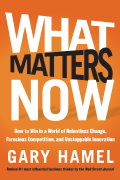
By Gary Hamel
(Jossey-Bass, $26.95, 304 pp.)
"This is not a book about doing better. It's not a manual for people who want to tinker at the margins of their organizations. Instead, it's an impassioned plea to reinvent management as we know it—to rethink the fundamental assumptions we have about capitalism, institutions, and life at work."
Author Gary Hamel's passion is at the forefront of every page of this visionary tome. He describes a world in which organizations are not run according to the systems by which they were founded—systems characterized by discipline, hierarchy, and bureaucracy. Instead, he imagines businesses that seek to innovate at their core and shake off the shackles of outdated, industrial-era processes. He depicts managers who uphold freedom, collaboration, and principles; and organizations that are fit for the future and fit for human beings.
To Hamel, five issues are paramount for determining whether an organization will thrive in the coming years: values, innovation, adaptability, passion, and ideology. Values-driven leaders practice stewardship distinguished by fealty, charity, prudence, accountability, and equity. They advocate for basic human values—such as love, beauty, and justice—rather than the utilitarian pursuits of profit, advantage, and efficiency. Innovative organizations lead, aim to surprise, act unreasonably, innovate incessantly and pervasively, sweat the details, and think like engineers, yet feel like artists.
Adaptability is about changing as fast as the surrounding world. Hamel purports that so many organizations fail to adapt because centuries-old management practices, designed to be routine and rigid, still rule today. However, "what matters now is not merely a company's competitive advantage at a point in time, but its evolutionary advantage over time." He practically outlines how leaders can future-proof their companies in Section 3.5, "a chapter that should have been a book."
Finally, organizations that operate with passion and ideology put individuals ahead of the institution by emphasizing community over hierarchy, making leaders more accountable to the led, and aligning rewards with contribution instead of power and position. They empower their people by unleashing a credo of freedom in place of control.
What Matters Now is brimming with stories of companies that exemplify the qualities indicative of management 2.0. Prepare to be inspired by Hamel's brilliance and zeal, anticipative of change, and fortified for the future of business and leadership. Four cups!
Personality Style at Work: The Secret to Working with (Almost) Anyone
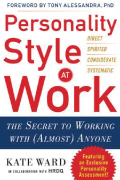
Kate Ward
(McGraw-Hill, $27, 256 pp.)
According to Ward, the most important business skill is understanding your own personality style and making it work well with others. To help you understand your style, Personality Style at Work includes a research-based assessment derived from a model of four main personality styles—direct, spirited, considerate, and systematic. Ward discusses how to mesh and manage your personality with the personalities of the colleagues you work with every day. In every workplace there are difficult employees; reading Personality Style at Work can help lead to a better understanding of those employees and a more productive workplace.
The Virtual Manager: Cutting-Edge Solutions for Hiring, Managing, Motivating, and Engaging Mobile Employees
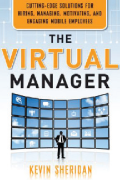
Kevin Sheridan
(Career Press, $15.99, 224 pp.)
As we enter into the digital age, managers must learn to adapt to the ever-increasing wave of technology. Sheridan provides a "tell-all" manual for managers who work with employees digitally from home. The Virtual Manager covers building trust in virtual teams, overcoming challenges associated with virtual work, developing or altering policies and procedures, and managing business outcomes through flexible arrangements. The book also outlines the qualities that employees need to have to thrive as virtual workers, and the top 10 drivers for engaging virtual employees.
Boundless Potential: Transform Your Brain, Unleash Your Talents, Reinvent Your Work in Midlife and Beyond
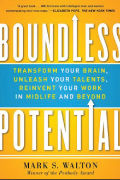
Mark S. Walton
(McGraw Hill Professional, $25, 262 pp.)
Walton, a former journalist, has written a book to inspire and provide practical advice for midlife workers wishing to continue to grow and thrive professionally. He notes that traditional retirement often is not appealing to veteran white-collar professionals, who tend to have a strong need to continue contributing. The author shares research from the latest in brain science, creativity, and human performance, as well as insights from interviews with those effectively reinventing themselves. Boundless Potential outlines methods to translate "personal fascination," or passions, into action, and to determine the structure necessary to make new midlife pursuits work in the marketplace.
What's on Michael Marquardt's Bookshelf?
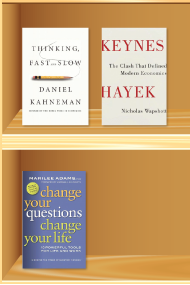
Thinking, Fast and Slow by Daniel Kahneman. We think in two ways or systems. The author does a wonderful job of describing the power and limitations of intuitive and fast learning and the need for reflective, attentive slow learning, which is deeper and can improve fast learning. Understanding these types of learning can be valuable for problem solving, learning, and systems thinking.
Keynes Hayek: The Clash That Defined Modern Economics by Nicholas Wapshott. This interesting book discusses how the two greatest economists of the 20th century affect government decision making in the 21st century. Issues such as centralized planning versus individual freedom affect how public leaders deal with issues of employment, training, trade policies, and so on, all of which should influence the macro-thinking and planning of workplace learning leaders.
Change Your Questions, Change Your Life by Marilee Adams. I am ever more convinced of the importance of questions in my life and in my work. The questions we ask determine who we are and what our life will be; questions are the essence of continuous learning and action learning. Questions are at the core of how we listen, behave, think, and relate—as individuals and organizations. Virtually everything we think and do is generated by questions. Questions open new doors and push us into new territories.
You've Reached ATD Member-only Content
Become an ATD member to continue
Already a member?Sign In
